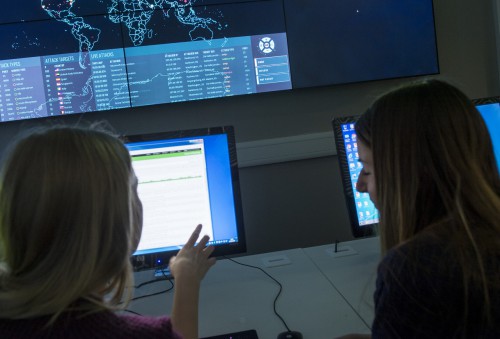The focus of ‘Cybersecurity Revolution’ will move from Scotland to Canada, then back to Europe via South America and the Far East, using the power of the internet to showcase cutting edge research as it follows the sun for 24 hours.

Edinburgh Napier will kick off the Thursday May 31 international collaboration on how to make cyberspace a safer place with its International Conference on Big Data in Cyber Security at the Craiglockhart campus.
The summit will bring together key players in industry, academia and law enforcement to share ideas and insights into how to respond to online security threats and detect malicious activity.
The event - hosted by the university’s Cyber Academy - will spotlight best practice in industry and in network investigation, consider the impact of high-profile security incidents and discuss leading tools and techniques in threat analysis.
Among those delivering talks, presentations and research papers are Professor Madjid Merabti, of Liverpool John Moores University, who will explore security issues relating to the proliferation of devices which capture human digital memories.
Professor Colin Williams, of Software Box Ltd, will examine human relationships to Big Data through the lens of Cybernetics, and ECS’s Harry McLaren will focus on frameworks for enforcing change management.
Mark Menzies, of Check Point – whose expert knowledge of the challenges faced by organisations tasked with protecting data has been incorporated into Edinburgh Napier programmes and its on-campus Virtual Security Operations Centre ¬- will deliver a session on Artificial Intelligence and Cyber Security.
Also included in the Edinburgh event are local innovators such as Dr Jamie Graves (ZoneFox), David Stubley (7 Elements) and Federico Charosky (Quorum Cyber), along with leading companies in the field such as Carbon Black, Secureworks and LogRhythm.
Alongside the conference the event includes a research track, which is being run by Dr Naghmeh Moradpoor, winner of Outstanding Woman in Cyber at last year’s Scottish Cyber Awards.

Professor Bill Buchanan, of Edinburgh Napier’s School of Computing, said: “Threats to organisations increase by the day, and many have responded by moving towards the integration of SIEM (Security Information and Event Management) to detect malicious activity.
“Our conference will share expertise in responding to security challenges, and will launch what could be the largest cyber security event ever, following the sun across the planet.”
Adrian Smales, who organised the link with Canadian collaborators and has been involved in the global scale-up, said: “This is a unique event which we hope will build strong bonds across the world. Edinburgh has one of the most advanced infrastructures for research and innovation related to Cybersecurity, and this event highlights its importance to the local economy and its presence on a world-stage.”
Further information here on the International Conference on Big Data in Cyber Security, sponsored by SBL (Software Box Ltd) in collaboration with SICSA Cyber Nexus.
After the Edinburgh conference, Cybersecurity Revolution will continue its march across the planet, encouraging interaction among the research community via video streaming from events at venues including the University of New Brunswick, Université de Montréal, L'Université du Québec (all Canada),Universidad EAN (Colombia), Hallym University (South Korea), Université de Lausanne (Switzerland), The Hebrew University of Jerusalem (Israel) and the Netherlands Institute for the Study of Crime and Law Enforcement.